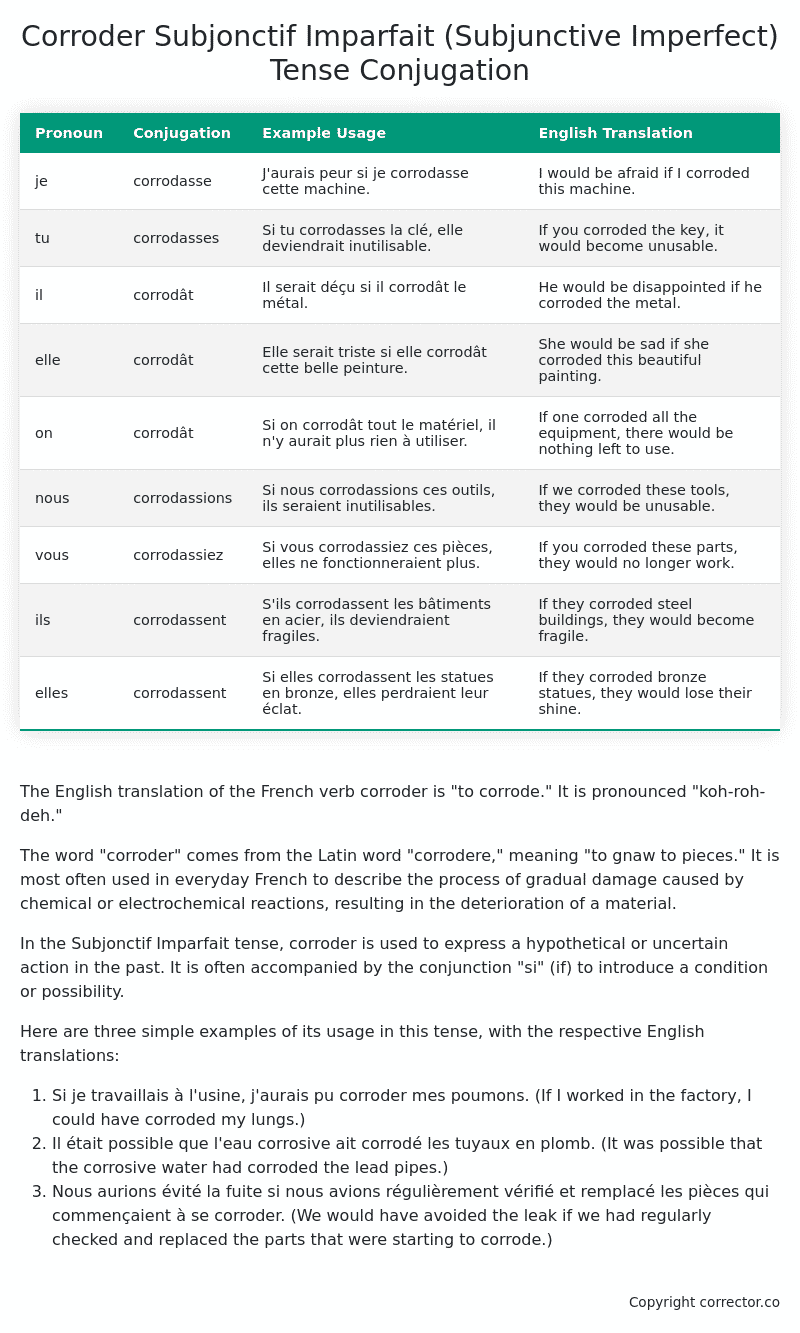Subjonctif Imparfait (Subjunctive Imperfect) Tense Conjugation of the French Verb corroder
Introduction to the verb corroder
The English translation of the French verb corroder is “to corrode.” It is pronounced “koh-roh-deh.”
The word “corroder” comes from the Latin word “corrodere,” meaning “to gnaw to pieces.” It is most often used in everyday French to describe the process of gradual damage caused by chemical or electrochemical reactions, resulting in the deterioration of a material.
In the Subjonctif Imparfait tense, corroder is used to express a hypothetical or uncertain action in the past. It is often accompanied by the conjunction “si” (if) to introduce a condition or possibility.
Here are three simple examples of its usage in this tense, with the respective English translations:
- Si je travaillais à l’usine, j’aurais pu corroder mes poumons. (If I worked in the factory, I could have corroded my lungs.)
- Il était possible que l’eau corrosive ait corrodé les tuyaux en plomb. (It was possible that the corrosive water had corroded the lead pipes.)
- Nous aurions évité la fuite si nous avions régulièrement vérifié et remplacé les pièces qui commençaient à se corroder. (We would have avoided the leak if we had regularly checked and replaced the parts that were starting to corrode.)
Table of the Subjonctif Imparfait (Subjunctive Imperfect) Tense Conjugation of corroder
| Pronoun | Conjugation | Example Usage | English Translation |
|---|---|---|---|
| je | corrodasse | J’aurais peur si je corrodasse cette machine. | I would be afraid if I corroded this machine. |
| tu | corrodasses | Si tu corrodasses la clé, elle deviendrait inutilisable. | If you corroded the key, it would become unusable. |
| il | corrodât | Il serait déçu si il corrodât le métal. | He would be disappointed if he corroded the metal. |
| elle | corrodât | Elle serait triste si elle corrodât cette belle peinture. | She would be sad if she corroded this beautiful painting. |
| on | corrodât | Si on corrodât tout le matériel, il n’y aurait plus rien à utiliser. | If one corroded all the equipment, there would be nothing left to use. |
| nous | corrodassions | Si nous corrodassions ces outils, ils seraient inutilisables. | If we corroded these tools, they would be unusable. |
| vous | corrodassiez | Si vous corrodassiez ces pièces, elles ne fonctionneraient plus. | If you corroded these parts, they would no longer work. |
| ils | corrodassent | S’ils corrodassent les bâtiments en acier, ils deviendraient fragiles. | If they corroded steel buildings, they would become fragile. |
| elles | corrodassent | Si elles corrodassent les statues en bronze, elles perdraient leur éclat. | If they corroded bronze statues, they would lose their shine. |
Other Conjugations for Corroder.
Le Present (Present Tense) Conjugation of the French Verb corroder
Imparfait (Imperfect) Tense Conjugation of the French Verb corroder
Passé Simple (Simple Past) Tense Conjugation of the French Verb corroder
Passé Composé (Present Perfect) Tense Conjugation of the French Verb corroder
Futur Simple (Simple Future) Tense Conjugation of the French Verb corroder
Futur Proche (Near Future) Tense Conjugation of the French Verb corroder
Plus-que-parfait (Pluperfect) Tense Conjugation of the French Verb corroder
Passé Antérieur (Past Anterior) Tense Conjugation of the French Verb corroder
Futur Antérieur (Future Anterior) Tense Conjugation of the French Verb corroder
Subjonctif Présent (Subjunctive Present) Tense Conjugation of the French Verb corroder
Subjonctif Passé (Subjunctive Past) Tense Conjugation of the French Verb corroder
Subjonctif Imparfait (Subjunctive Imperfect) Tense Conjugation of the French Verb corroder (this article)
Subjonctif Plus-que-parfait (Subjunctive Pluperfect) Tense Conjugation of the French Verb corroder
Conditionnel Présent (Conditional Present) Tense Conjugation of the French Verb corroder
Conditionnel Passé (Conditional Past) Tense Conjugation of the French Verb corroder
L’impératif Présent (Imperative Present) Tense Conjugation of the French Verb corroder
L’infinitif Présent (Infinitive Present) Tense Conjugation of the French Verb corroder
Struggling with French verbs or the language in general? Why not use our free French Grammar Checker – no registration required!
Get a FREE Download Study Sheet of this Conjugation 🔥
Simply right click the image below, click “save image” and get your free reference for the corroder Subjonctif Imparfait tense conjugation!

Corroder – About the French Subjonctif Imparfait (Subjunctive Imperfect) Tense
Formation
Common Everyday Usage Patterns
Interactions with Other Tenses
Subjonctif Présent
Indicatif Passé Composé
Conditional
Conditional Perfect
Summary
I hope you enjoyed this article on the verb corroder. Still in a learning mood? Check out another TOTALLY random French verb conjugation!


